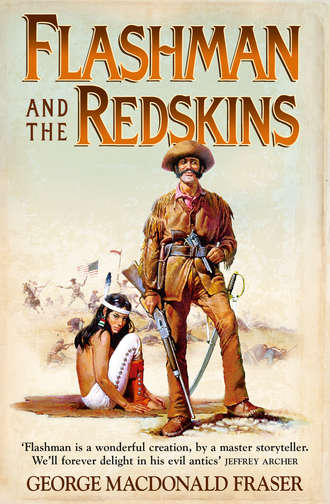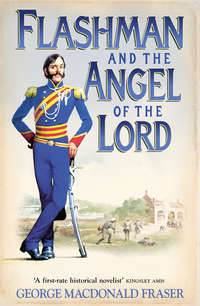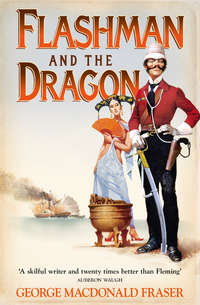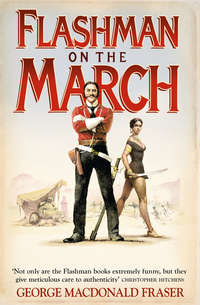
Полная версия
Flashman and the Redskins
I did, and there wasn’t a damned thing except my own belly rumbling. I strained my ears … and then I heard it, so soft that it was hardly a noise at all, more a vibration on the night air. My flesh prickled at the thought of horsemen – no, it might be buffalo on the move … too regular for that … and then my mouth went dry as I realised what it must be. Somewhere, out in that enveloping blackness, there was a soft, steady sound of drums.
‘Jesus!’ I breathed.
‘I doubt it,’ whispered Grattan. ‘Say Lucifer, and ye’ll be nearer the mark.’
He jerked his head, and before I knew what I was properly doing I was following him up the slope to the west of our hollow; there was a little thicket of bushes, and we crawled under it and wormed our way forward until we could part the grass on the crest and see ahead. It was black as the earl of hell’s weskit, but there, miles ahead in the distance, were five or six flaring points of light – Indian camp-fires, without a doubt, along the river bank. Which meant, when you thought about it, that they lay slap on our line of march.
We watched for several minutes in silence, and then I said, in a hoarse croak: ‘Maybe they’ll be friendlies.’ Grattan said nothing, which was in itself an adequate answer.
You may guess how much we slept that night. Grattan and I were on the watch as dawn broke, when their fires had disappeared with the light and instead we could see columns of smoke, perhaps five miles away, along the river; it looked like a mighty camp to me, but at such a distance you couldn’t tell.
There was no question of our stirring, of course. We must just lie up and hope they would move, and sure enough, about noon we realised that the dark strip which had been the camp was shifting – downriver, in our direction. Grattan cursed beneath his breath, but there was nothing for it but to lie there and watch the long column snaking inexorably towards us past the cottonwood groves. It wasn’t more than a mile away, and I was all but soiling myself in fear, when the head of the column veered away from the river, and I recollected with a surge of hope that our hollow lay in a wide bow of the river; if they held their march along the bowstring, they might pass us by, damnably close, but unless one of them scouted the bank they would never realise we were there.
We scurried down and had the teamsters stand by their beasts, enjoining utter silence; my chief anxiety was the invalids, who were such a feckless lot that they might easily blunder about and make a noise, so I ordered them into their carriages with instructions to sit still. Then Grattan and I wormed back to the crest, and took a look.
That was a horrible sight, I can tell you. The head of the column wasn’t above three hundred yards away, moving slowly past our hiding place. There was a great murmur rising from it, but not much dust after the rain, and we had a clear view. There were warriors riding in front, some with braided hair and coloured blankets round their shoulders, others with the lower part of their skulls shaved and top-knots that bristled up, whether of hair or feathers I couldn’t tell. Then came what was either a chief or a medicine man, almost naked, on a horse caparisoned in coloured cloth to the ground; he carried a great staff like a shepherd’s crook, ribboned and feathered, and behind walked two men carrying little tom-toms that they beat in a throbbing rhythm. Then more warriors, with feathers in their hair, some in blankets, others bare except for breech-clouts or leggings; all were garishly painted – red, black and white as I recall. Almost all were mounted on mustangs, but behind came the usual disorderly mess of travois and draught animals and walking families and cattle and dogs and general Indian foulness and confusion. Then the rearguard, after what seemed an interminable wait; more mounted warriors, with bows and lances, and as they drew level with us I found myself starting to breathe again: we were going to escape.
Whether that thought travelled through the air, I don’t know, but suddenly one of the riders wheeled away from the others and put his pony to the gentle slope running up to our position. He came at a trot, straight for us, and we watched, frozen. Then Grattan’s hand came out from under his body, and I saw he had his Bowie turned in his fist; I clapped a hand over it, and he turned to stare at me: his eyes were wild, and I thought, by gum, Flashy, you ain’t the only nervous one on the Plains this day. I shook my head; if the savage saw us, we must try to talk our way out – not that there’d be much hope of that, from what we’d seen.
The Indian came breasting up the hill, checked, and looked back the way they had come, towards the camp-ground, and I realised he was taking a last look-see. He wasn’t twenty yards away, close enough to make out every hideous detail of the buffalo-horn headdress, embroidered breech-clout, beaded garters wound round his legs above the moccasins, the oiled and muscular limbs. He had a lance, a little round shield on his arm, and a war-club hung from his belt. He sat at gaze a full minute, and then rode slowly along just beneath our hide, with never an upward glance; he paused, leaning down to clear a tangle of weed from his foot – and in the hollow behind us some fool dropped a vessel with a resounding clatter.
The Indian’s head lifted, the painted face staring directly at our bush; he straightened in his seat, head turning from side to side like a questing dog’s. He looked after his party, then back towards us. Go away, you awful red bastard, go away, I was screaming inwardly, it’s only a kettle or a piss-pot dropped by those infernal hypochondriacs; Christ, it’s a wonder you can’t hear the buggers wheezing … and then he trotted down the hill after the retreating column.
We waited until the last of them were well out on the plain and vanishing into the haze before we even stirred – and then I made the terrifying discovery that while Grattan and I had been lying too scared to breathe, and Susie had been sitting tight-lipped in her coach with her eyes shut, three of the sluts – Cleonie, black Aphrodite, and another – had crawled up to a point on the crest to watch the passing show! Giggling and sizing up the bucks, I don’t doubt; how they hadn’t been spotted …
We moved out in some haste. You ain’t seen galloping oxen? Within the hour we had passed through the appalling filth and litter of the deserted Indian camp, and it seemed reasonable to hope that a band of such size would be the only one in the vicinity. I asked Grattan who they were; he thought, from the bright-coloured blankets and the buffalo-scalp cap, that they might be Cumanches, but wasn’t sure – I may tell you now, from a fairish experience of Indians, that they’re a sight harder to identify by appearance than, say, Zulu regiments or civilised soldiers; they ain’t consistent in their dress or ornament. I remember Charley Reynolds, who was as good a scout as ever lived, telling me how he’d marked down a band as Arapaho by an arrow they’d fired at him – he found out later they’d been Oglala Sioux, and the arrow had been pinched from a Crow. That by the way; Grattan didn’t cheer me up much by remarking that the Cumanche are cannibals.
We pushed on, and towards evening I smelled smoke. We went to ground at once, and camped without fires, and in the morning moved ahead cautiously until we caught the scent of charred wood. Sure enough, there it was, a little way off the trail – the blackened shell of a wagon, with little drifts of smoke still coming from it. There were three white corpses sprawled among the wreck, two men and a woman; all had been shot with arrows, scalped, and foully mutilated. Grattan went round the wagon, and cursed; I went to look and wished I hadn’t. On the other side were two more bodies, a man’s and a young girl’s, though it wasn’t easy to tell; they had been spreadeagled and fires lit on top of them. If that Indian in the buffalo cap had ridden a few yards farther, we would have been served the same way.
We buried them in a cold sweat, and pressed on quickly; oddly enough, though, the knowledge of our escape raised our spirits, and it was with cries and hurrahs that afternoon that we passed the mouth of the Picketwire,24 which joins the Arkansas about fifteen miles below Bent’s. One or two of the savaneros were uneasy that there was still no sign of civilised life so close to the fort; there were normally bands of trappers and traders to be seen, and friendly Indians camped on the Picketwire, they said. But Grattan pointed out that with so large a band of hostiles on the prowl, the normal traffic wasn’t to be expected; they’d be staying snug behind the wall at Bent’s.
We were all eager to see this famous citadel of the plains, and in camp that night Grattan entertained Susie with a recital of its wonders; to hear him it was like finding Piccadilly in the middle of the Sahara.
‘You’ll be wonderstruck, ma’am,’ laughs he. ‘You haven’t seen a building worth the name since we left Westport, have you? Well, tomorrow, after a thousand miles of desolation, you’ll see a veritable castle on the prairie, with towers and ramparts – oh, and shops, too! It’s a fact, and all as busy as Stephen’s Green. This time tomorrow you’ll be watching the captain here playing skittle pool in the billiard-room, with a wee man in a white coat skipping in with refreshment, and you’ll sleep on a down mattress after a hot bath and the best dinner west of St Louis, so you will.’
We were off at dawn of a brisk, bright day with the breeze fluttering the cottonwoods as we rolled along by the river at our best pace. We nooned without incident; just an hour or two, thinks I, and we’ll be through this horror and can lie up until other trains appear, and then head for Santa Fe in safety, with some other idiot riding wagon-boss. We were all in spirits; Susie was laughing and listening to Grattan as he rode by the carriage, the tarts had their wagon-covers up and were chattering like magpies in the sunshine, and even the invalids had perked up and were telling each other that this was more bracing than Maine, by George; I caught Cleonie’s demure glance as I rode by her wagon, and reflected that Bent’s must be big enough to find a more comfortable private nook than a prairie tent. And then I saw the smoke.
It was a single puff, above the gentle crest to our right, floating up into the clear sky, and while I was still gaping in consternation, there they were – four mounted Indians on the skyline, trotting down the slope towards us. Grattan swore softly and shaded his eyes, and then swung to the coach driver.
‘Keep going – brisk, but not too fast! Easy, now, captain – that smoke means there’ll be others coming lickety-split; you’ll note we’re only worth a single puff, bad cess to ’em!25 So we must keep ’em at a distance till we get within cry of Bent’s; it can’t be above a couple of miles now!’
My instinct was to turn and ride for it, but he was right. The four Indians were coming on at a brisk canter now, so with Grattan leading we rode out to head them away, me with my sweat flowing freely – the sight of those oily copper forms, the painted faces, the feathers, and the practised ease with which they managed ponies and lances, would have turned your stomach. They rode along easily, edging only gradually closer.
‘They won’t show fight till the regiment arrives,’ says Grattan. ‘Watch in case they try to side-slip us and scare the wagon-beasts – ah, you bastard, that’s the trick! See, captain!’
Sure enough, they had their blankets ready in their hands; their leader, riding parallel with us about twenty yards off, raised his and shouted ‘Tread!’, which I took to mean ‘trade’ – a likely story.
‘Give ’em a hail,’ says Grattan, so I shouted ‘Bugger off!’ and made gestures of dismissal. The brave shouted something back, in apparent disappointment, turned his pony slightly aside – and then without warning wheeled sharply and, with his mates following suit as smart as guardsmen, made a dart across our rear towards the wagon-train.
‘Donnybrook!’ yells Grattan, and I heard his Colt bang at my elbow. An Indian twisted and fell shrieking, and as the leader’s horse sped past me I gave it a barrel in the neck – in a mêlée you shoot at what you’re sure to hit – and then my heels went in and my head down as I thundered for the wagons.
The two remaining braves were making for the rear wagon, swooping in, flapping their blankets at the beasts. I roared to the teamsters to whip up; they shouted and swung their snakes, and the wagons lurched and bounced in the ruts as the beasts surged forward. Grattan fired and missed one of the Indians; a teamster, reins in his teeth, let fly a shot that went nowhere, and then the two had wheeled past us and were racing out and away.
I galloped up the train, all eyes to see where the next danger was coming from. By God, I didn’t have to look far – on the crest to our right there was a round score of the brutes, swerving down towards us. They were perhaps two furlongs off, for the crest had swung away from the river, which was inclining in a big loop to the left, so that as the wagons veered to follow its course, they were also turning away from our pursuers. But in less than three minutes they would close the gap with the lumbering train.
Ahead of me, Grattan was swinging himself from his saddle over the tailboard of a wagon, and farther ahead the savaneros of the mule-train were doing likewise, their mules running free. In among them came the two braves with blankets, screeching and trying to drive the leaderless brutes in among the wagons; Grattan’s rifle boomed and one of the braves went down; the other tried to throw himself at one of the wagon-teams, but must have missed his hold, for as I galloped by he was losing an argument with a wagon-wheel, and being deuced noisy about it.
The savaneros were firing now; Grattan yelled to me, pointing forward, and I was in solid agreement, for up yonder somewhere was Bent’s, and I didn’t mind a bit if I was first past the post. Half a dozen revolving rifles were letting go as I thundered up the train, which is just the kind of broadside you need when twenty painted devils are closing in; they weren’t more than two hundred paces off our rear flank now, whooping like be-damned and firing as they came. I was abreast the leading wagon, with only the two invalid carriages and Susie’s coach leaping along ahead; at my elbow the sluts were squealing and cowering behind the wagon-side; I saw a shaft quivering in the timber, and another hissed over my head; it’s time to get off this pony and under cover, thinks I – and in that moment the brute stumbled, and I had only a split second to kick my feet clear and roll before she went headlong.
Конец ознакомительного фрагмента.
Текст предоставлен ООО «ЛитРес».
Прочитайте эту книгу целиком, купив полную легальную версию на ЛитРес.
Безопасно оплатить книгу можно банковской картой Visa, MasterCard, Maestro, со счета мобильного телефона, с платежного терминала, в салоне МТС или Связной, через PayPal, WebMoney, Яндекс.Деньги, QIWI Кошелек, бонусными картами или другим удобным Вам способом.











